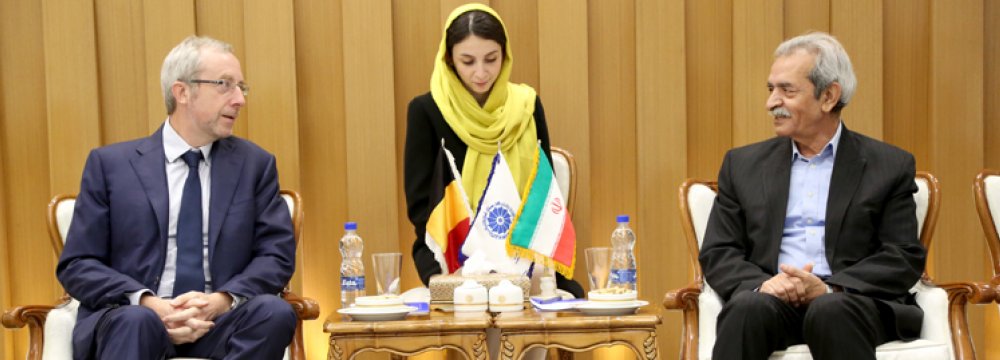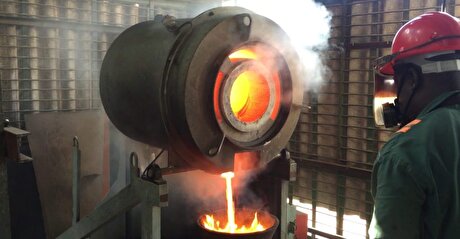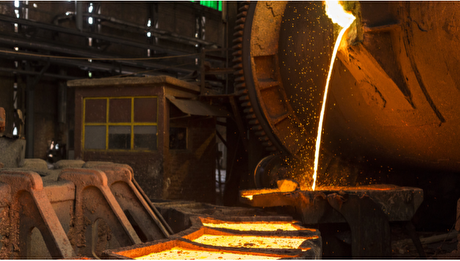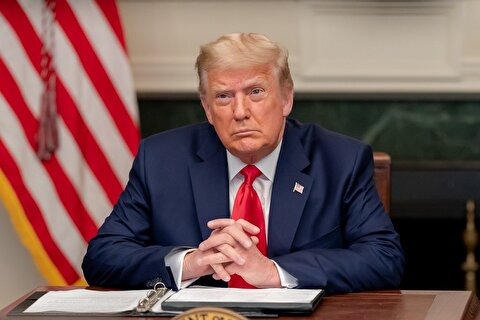
Iranian Banks Eye Belgium Branches

This was announced by Gholamhossein Shafei, the head of Iran Chamber of Commerce, Industries, Mines and Agriculture, during a meeting with a Belgian delegation headed by President of the Federation of Belgian Chambers of Commerce Rene Branders in Tehran.
“The most important requirements for both countries’ businesses are banking and insurance ties that have registered slight improvements after Iran’s nuclear deal, but they are still not enough,” Shafei was also quoted as saying by IBENA.
The private sector leader noted that Belgium’s economic, financial and trading strength is significant among European Union member countries and ties with that country is of high importance for Iranian companies and traders.
“The desire for expanding economic relations is obvious in both sides. Therefore, we have made plans for the Belgian delegation during their four-day visit in Tehran and Isfahan, and we hope to achieve beneficial results through negotiations,” he said.
This is while the Belgian ambassador to Tehran noted that there are plenty of opportunities to expand bilateral relations, as the economy of the two countries can be complementary.
“Because of the volatile atmosphere and US actions, banking and insurance ties have not improved at an acceptable pace, which is hoped to be resolved as soon as possible,” Francois Delhaye added.
The Belgian ambassador explained that in this situation of uncertainty, the visit of Belgian delegation has a special message and that Belgian companies are eager to extend their ties with Iran and the Belgian government has been also actively pursuing Iranian issues in EU.
Enforcing Past Agreements
The head of ICCIMA noted that the establishment of Iran-Belgium Economic Commission can considerably boost bilateral relations and urged the Belgian side to speed up the process.
“We have had many agreements with Belgium in the past, but both sides need to be more serious about their implementation, as it is one of the most important priorities to discuss with Belgian delegation,” he added.
This is while a few months ago, a 35-member delegation from ICCIMA led by Shafei wrapped up a visit to Belgium and Luxembourg to discuss expansion of economic cooperation.
The delegation held meetings with officials, including Minister-President of Flanders Geert Albert Bourgeois and Branders, in which both countries' representatives expressed their interest in increasing the level of mutual cooperation.
The Belgian ambassador to Tehran also called for implementing the previous agreements between the two countries, adding that "we're think about signing new ones".
“The bilateral investment agreement is the most important pact between Iran and Belgium, which has been improving slowly since it was agreed but we hope to speed up the process,” he added
Delhaye hoped that the Belgian delegation will finalize the investment agreement and pursue the bilateral tax exemption plan that has been the other objective of this trip.
“In order to absorb finance, I suggest that Iranian high-ranking banking and economic officials take a trip to Belgium to facilitate the establishment of banking and insurance ties,” he said.
As Shafei asked the Belgian official to ease the process of issuing visa for Iranian traders and businesspeople, the Belgian ambassador noted that Iranians have no legal problem in making a business trip to Belgium and in many cases, they face issues in acquiring a visa because there is something amiss with their documents.
Delhaye elaborated that the demand for business visa from Iranian traders have surged dramatically and the embassy is no longer able to handle this volume of applicants, so currently it is increasing the number of its employees and also considering other measures to resolve the issue.
Iran-Belgium trade stood at $723.83 million in 2016, according to figures released by ICCIMA.
Iran exported close to $190.57 million worth of goods to Belgium during the period, registering a 147% rise compared with 2015. Belgium exported nearly $533.27 million worth of products to Iran over the same period, indicating a 20.4% year-on-year increase.


Alba Discloses its Financial Results for the Second Quarter and H1 of 2025

US slaps tariffs on 1-kg, 100-oz gold bars: Financial Times

Copper price slips as unwinding of tariff trade boosts LME stockpiles

Codelco seeks restart at Chilean copper mine after collapse

NextSource soars on Mitsubishi Chemical offtake deal

Australia weighs price floor for critical minerals, boosting rare earth miners

Uzbek gold miner said to eye $20 billion value in dual listing

BHP, Vale offer $1.4 billion settlement in UK lawsuit over Brazil dam disaster, FT reports

Hudbay snags $600M investment for Arizona copper project

Zimbabwe labs overwhelmed as gold rally spurs exploration, miner says

Cochilco maintains copper price forecast for 2025 and 2026

Adani’s new copper smelter in India applies to become LME-listed brand

HSBC sees silver benefiting from gold strength, lifts forecast

Mosaic to sell Brazil potash mine in $27M deal amid tariff and demand pressures

Samarco gets court approval to exit bankruptcy proceedings

Hudbay snags $600M investment for Arizona copper project

Discovery Silver hits new high on first quarterly results as producer

Trump says gold imports won’t be tariffed in reprieve for market

AI data centers to worsen copper shortage – BNEF

Cochilco maintains copper price forecast for 2025 and 2026

Adani’s new copper smelter in India applies to become LME-listed brand

HSBC sees silver benefiting from gold strength, lifts forecast

Mosaic to sell Brazil potash mine in $27M deal amid tariff and demand pressures

Samarco gets court approval to exit bankruptcy proceedings

Hudbay snags $600M investment for Arizona copper project

Discovery Silver hits new high on first quarterly results as producer

Trump says gold imports won’t be tariffed in reprieve for market

AI data centers to worsen copper shortage – BNEF














